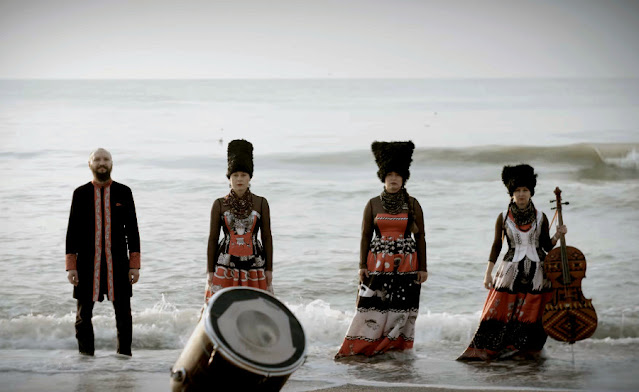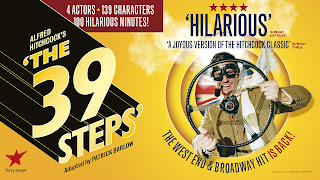Has theatre etiquette disappeared and should we be worried?
As you can probably guess from the amount of blogs I have written on the theatre, I am an avid theatre goer. Whenever I am given a chance and whenever the tickets are a reasonable price (I will rarely pay more than £35 for my tickets) I will go and see a show so I can soak in the atmosphere of the theatre. However the more time I spend on twitter the more I am met with the general theatre goer community, talking about their latest experiences at the theatre. In general many pose gripes about the 'lack of' etiquette the audience present at their show displayed. Therefore, I thought in todays blog I could question as to whether etiquette has really disappeared from the theatre and whether we should be worried.
A general rule of etiquette that is almost universally agreed upon when attending the theatre is that you shouldn't talk during the performance nor should you go on your phone. This rule is happily accepted by most as it is a rule we tend to have in many areas of everyday life. The most prominent of course being in the cinema, we are reminded at the start of every screening in almost every cinema that we should remain silent and stay off our phones to really experience the movie. This of course is also to grant common courtesy to those around us, because general chatter and the light from our phones can genuinely distract and annoy those around us. In general most abide by these rules in the cinema, only being disturbed by the occasional chatter-box every so often. The same also goes for the theatre. In all the years I have been seeing shows I have only been disturbed by phone usage once and by talking twice (although one of those occasions was because the woman was extremely drunk and decided to break out some dance moves as well). These general incidences came to pass pretty quickly (other than the drunk dancing) and the offenders either left at the interval or remained quiet for the remainder of the show. So we can state that the general etiquette that most instantly think of is most often sustained.
However, the theatre community that i have been observing on twitter over the past several months seem to hold that other etiquette is required when attending the theatre that is separate from the etiquette we often maintain in the cinema, the etiquette surrounds the notion of food, lateness and dress code. On the subject of food, much of the theatre community seems to state that you shouldn't eat through the performance (other than perhaps ice cream). They claim that this is because it is distracting if someone crumbles a sweet wrapper for example, on the surface this is seemingly understandable, there is little difference from the noise which comes from loud whispering and crumpling a sweet wrapper, other than perhaps the intention behind it. Many members of said theatre goers also believe one shows disrespect by dressing casually, sometimes holding the belief that you shouldn't wear a tshirt and jeans to the theatre, that you should instead be in attire similar to that of business casual, perhaps a skirt, suit pants or a dress instead of jeans. On the surface this also seems understandable etiquette given that traditionally the theatre was always a formal event, one need only think of certain opera houses to appreciate how formal dress is still expected in theatre settings. The last is an expectation that one shouldn't be late to the theatre. In general this is expected etiquette by all, because one would disservice oneself by missing part of the show. However, having seen a debate recently on twitter I have seen some theatre fans go further that admission should be refused completely if the show started before you made it to the theatre. Perhaps this can be seen as a sufficient condition to theatre going because after all if you have to enter during the show you will obscure the view of who ever you need to pass and disturb them, forcing them to miss parts of the show. Indeed, these rules of etiquette are far stricter than the cinema yet there do seem to have legitimate basis.
So the question then is that should we follow this etiquette that the twitter theatre community has laid out and should we be concerned over the fact that it is often not followed. My answer to this question is no, indeed, the etiquette that I have just laid out is too strict and in fact highlights the theatre communities general elitism. Firstly to address the issue of dress code, i believe the shift from formal dress to casual dress in the theatre is perhaps a good thing, as it shows that the audience is now more diverse. In the past much of the theatre audience was made up by the upper and middle class, those who owned formal attire and viewed that if one was attend a high cost event then one should dress as such. Yet, today the theatre is becoming flooded with more working class people due to theatres now opening the door to poorer audiences by offering cheap tickets through sites such as today tix. Indeed, you can get £10-15 tickets for many shows on the west end and as such those who could not afford the theatre previously can now attend. But a result of this is that many of those in attendance either do not have formal attire or do not know that to be respectful such dress is expected of them, as many would not be avid theatre goers and many would be going to the theatre for the first time. To judge an audience member based on their dress is to claim you are superior to them and to refuse to understand why one may not wear formal attire to such events, it comes from a place of privilege where one can afford to dress formally or knows what dress is expected on the basis of being able to attend multiple shows.
Furthermore, the notion that one should not eat during a show also comes from a place of privilege. Whilst wrappers may often be annoying by believing one is disrespectful for eating during a show is to once again assume they are privileged enough to attend multiple shows and realise that such crinkly papers are annoying in the theatre. It is also to disregard that someone may need to eat due to illness or perhaps even because they didnt get a chance to eat before the performance. Given that many theatres actually sell sweets and other snacks indicates that this rule of theatre etiquette is rather inconsequential because crinkly paper posed any real issue for the enjoyment of the show theatre staff would not sell food to patrons, the fact that i have never once been distracted by someone eating leads me to believe this rule of etiquette the theatre community has proposed is perhaps one to determine themselves better than the average occasional theatre attender because they follow this rule of etiquette that no one else seems to know about.
Finally the rule of etiquette when it comes to lateness. As stated earlier this sparked my interest when i saw a twitter debate, a user simply stated that if the person arrived late it would be far better if they were treated with kindness by the staff. This was met with an onslaught of replies claiming that this should not be the case instead the person should be refused entry because it was their fault that they were late and it would be unfair to everyone else that arrived on time. Yet again however this comes from a place of privilege and elitism. The one time I was late to a theatre show was because a man tried to take his own life directly next tot my train carriage. Therefore, I arrived at the theatre 5 minutes after the performance begun (despite having left so id reach london 2 hours before the show.) The theatre staff was very nice to me, they didnt ask any questions and showed me to my seat. However if they had been rude or refused me entry i may have had a mental breakdown there and then given the traumatic experience I had only a little while previous. Whilst of course this is a very special circumstance there are plenty of reasons one may be late to a show, their train was cancelled, it was impossible to leave work earlier or maybe they even got lost. The fact that they were late does not dictate that they are any less deserving to see the show than those who arrived on time or even disrespectful. Personally I would rather have a 20 second distraction of some one having to pass me when the show was going on then knowing that there were people who perhaps had their whole week ruined by not being able to see a show they paid for. And indeed, by the twitter theatre community arguing that entrance must be denied for any late comers is to once again take a place of superiority whilst refusing to recognise others circumstance. Indeed they assume that because they are a true theatre fan, they would never be late to a show any one who is likely doing so because they dont care about the show (because of course they care about the show and are never late). But they fail to recognise that they are privileged to be able to arrive at the theatre with time to spare, that they may not have to stay in work until 7pm. Indeed by demanding that you should never be late to the theatre and must accept no admittance if you are, is to refuse to look at others lives outside your own and to assume that because you are a frequent theatre goer that you are more important than every one else. Indeed, it is within etiquette rules to not arrive at the theatre late i you can help it but you are not imposing on theatre etiquette by being admitted to the show if you are late, this view simply comes from a group of people in the place of privilege.
Indeed therefore, I conclude that in general theatre etiquette has not been displaced as the general underlying rules still remain. Rather that those who believe that stricter rules should be followed are simply speaking from a place of privilege and should instead regard other theatre goers as people and their equals.





Comments
Post a Comment